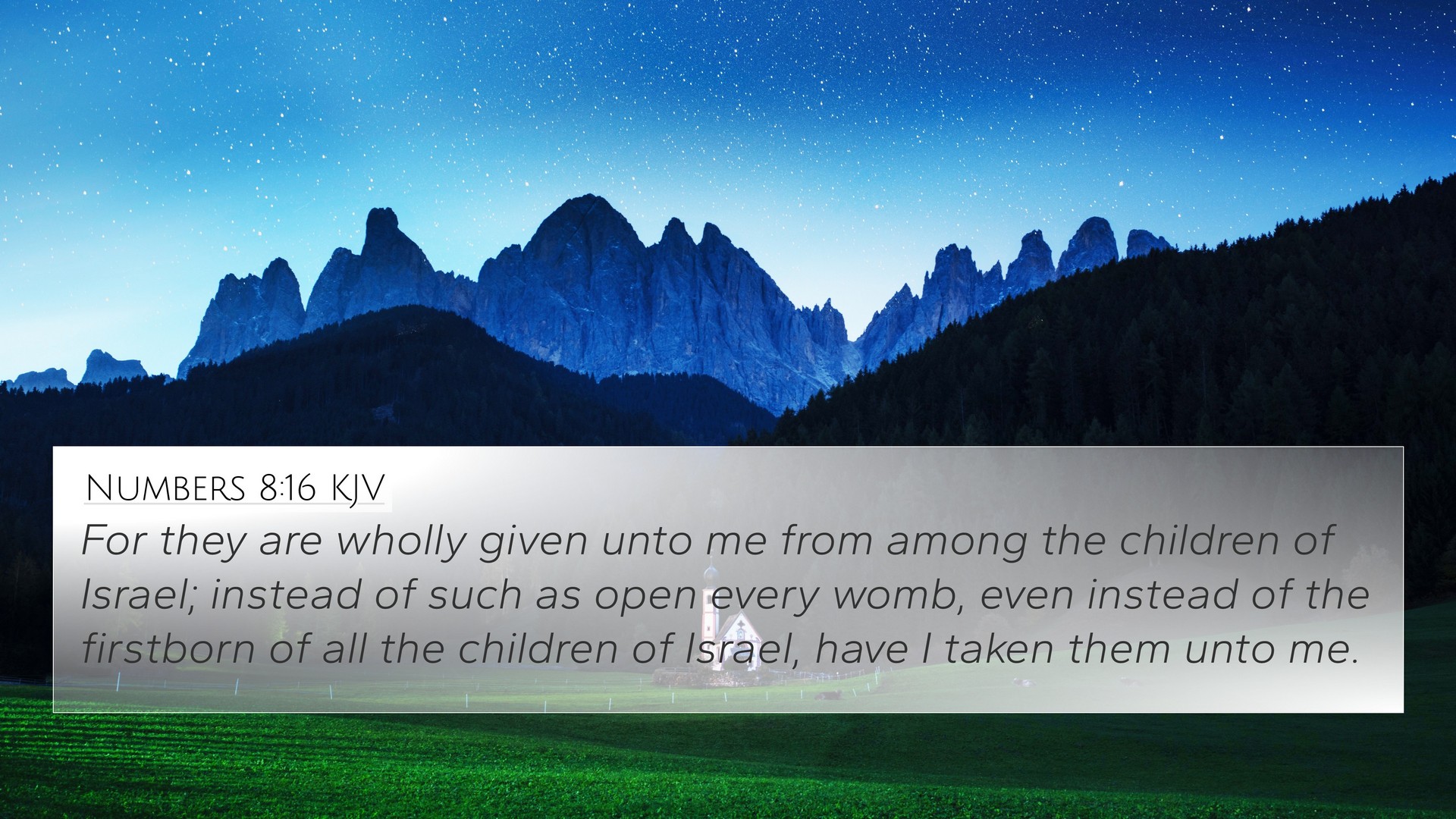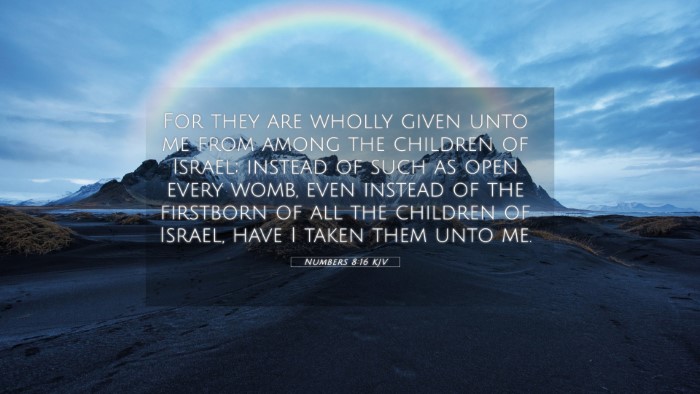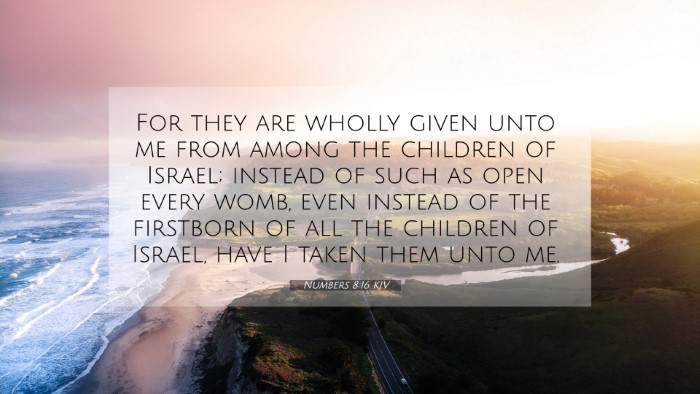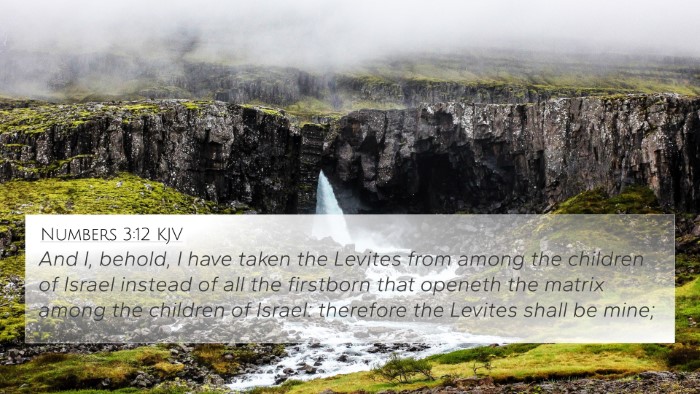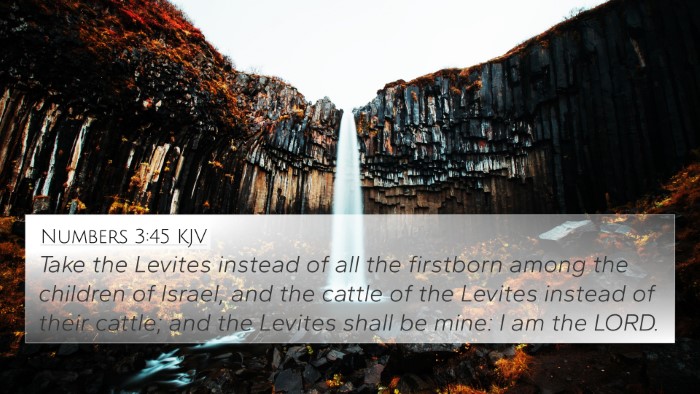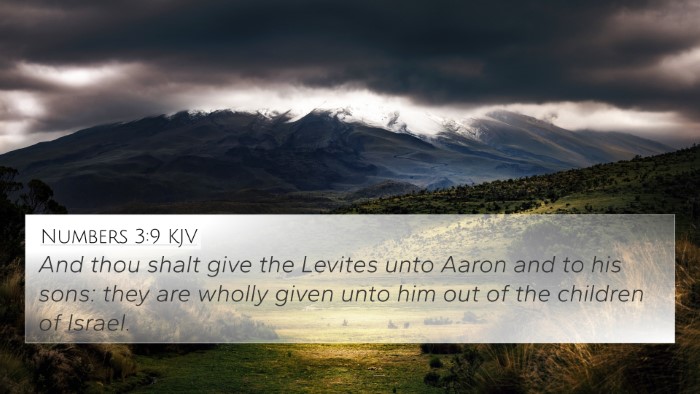Understanding Numbers 8:16
Numbers 8:16 states, "For they are wholly given unto me from among the children of Israel; instead of such as open every womb, even instead of the firstborn of all the children of Israel, have I taken them unto me." This verse reflects God's specific purpose for the Levites as a set-apart tribe, tasked with spiritual duties and service in the tabernacle.
Meaning and Implications
The significance of this verse can be understood more deeply through insights provided by historical commentaries:
- Matthew Henry: In his commentary, Henry emphasizes the consecration of the Levites as a representation of God's election. He points out that the Levites are chosen to serve in a special role, signifying a physical and spiritual separation from the other tribes of Israel.
- Albert Barnes: Barnes highlights the idea of substitution in the divine plan. God chooses the Levites instead of the firstborn sons who traditionally held a significant role in worship and sacrifice, illustrating the principle of grace and selection based on divine will rather than human merit.
- Adam Clarke: Clarke provides an analysis of the implications of this selection, indicating that it not only signifies God's ownership over the nation of Israel but also underscores the responsibilities that come with being 'given' to God, such as holiness and service unto Him.
Cross-References
This verse connects with several other Biblical passages that reveal similar themes of consecration and divine selection:
- Exodus 13:2: "Sanctify unto me all the firstborn, whatsoever openeth the womb among the children of Israel, both of man and of beast: it is mine."
- 1 Peter 2:9: "But ye are a chosen generation, a royal priesthood, an holy nation, a peculiar people; that ye should shew forth the praises of him who hath called you out of darkness into his marvelous light."
- Romans 12:1: "I beseech you therefore, brethren, by the mercies of God, that ye present your bodies a living sacrifice, holy, acceptable unto God, which is your reasonable service."
- Hebrews 10:10: "By the which will we are sanctified through the offering of the body of Jesus Christ once for all."
- Numbers 3:12-13: "And I, behold, I take the Levites from among the children of Israel instead of all the firstborn that openeth the matrix among the children of Israel: therefore the Levites shall be mine; because all the firstborn are mine."
- Luke 10:2: "Therefore said he unto them, The harvest truly is great, but the laborers are few: pray ye therefore the Lord of the harvest, that he would send forth laborers into his harvest."
- 1 Corinthians 6:19-20: "What? know ye not that your body is the temple of the Holy Ghost which is in you, which ye have of God, and ye are not your own? For ye are bought with a price: therefore glorify God in your body, and in your spirit, which are God's."
Thematic Connections
By examining Numbers 8:16, we can establish a broader understanding of several themes present in both the Old and New Testaments, highlighting why cross-referencing these scriptures is crucial for a holistic biblical interpretation:
- Grace and Election: The choosing of the Levites instead of the firstborn signifies God's sovereign choice, as seen in Ephesians 1:4-5.
- Service and Sacrifice: The idea of being set apart for God's service is echoed in Hebrews, as believers are called to present themselves as living sacrifices.
- Holiness and Separation: God’s demand for holiness among His chosen is emphasized throughout Levitical laws (Leviticus 20:26).
Conclusion
Numbers 8:16 serves as a pivotal verse that invites believers to reflect on the themes of consecration, service, and divine selection. Through tools for Bible cross-referencing, such as a Bible concordance or a cross-reference Bible study method, one can explore these connections further. These thematic Bible verse connections provide insight into the workings of God’s plan and His expectations of His people, both in ancient Israel and today.
Further Study and Reflection
For those seeking to delve deeper into the meanings of this and related scriptures, consider utilizing a comprehensive Bible cross-reference guide or applying cross-referencing Bible study methods to discern the layers of meaning in your devotional practice.
